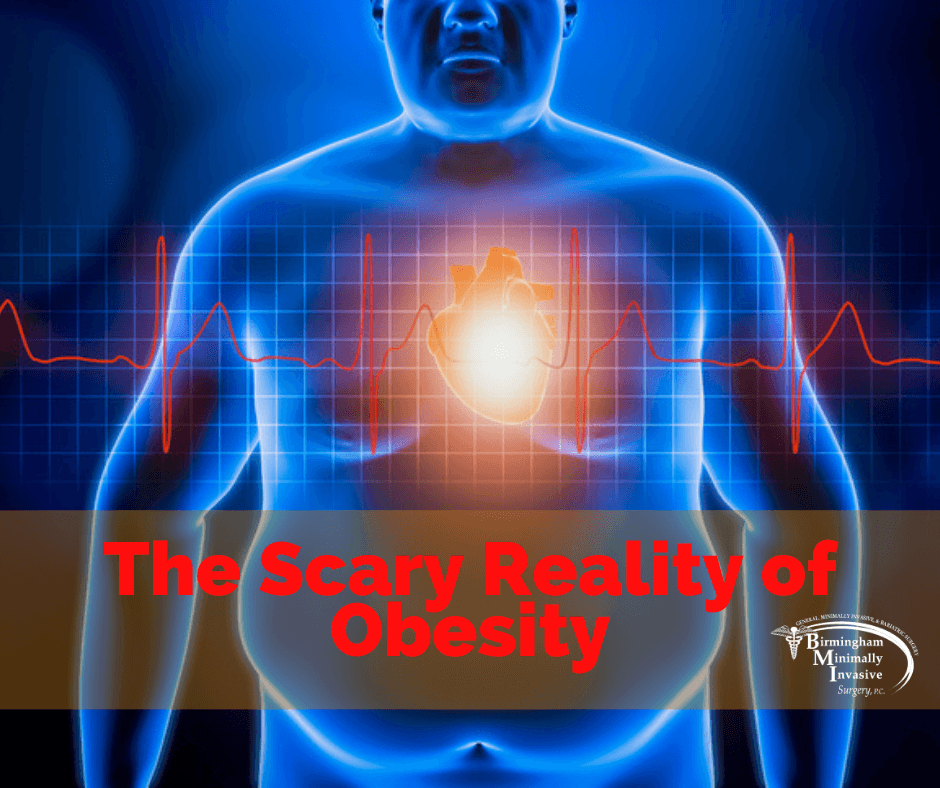
Obesity is a growing problem in the U.S., and it has become a hot topic recently due to its connection with more severe outcomes of COVID-19. However concerning obesity already was, when you throw a pandemic in the mix, it’s a situation that gets even scarier.
Recently, the CDC released the 2019 Adult Obesity Prevalence Maps for 49 states, the District of Columbia, and two U.S. territories. The maps show self-reported adult obesity prevalence by race, ethnicity, and location. The data comes from the Behavioral Risk Factor Surveillance System, an on-going state-based, telephone interview survey conducted by CDC and state health departments.
The 2019 maps show that obesity impacts some groups more than others, but the overall results are frightening. No states are doing well when it comes to reducing obesity rates, and Alabama, the home state of Birmingham Minimally Invasive Surgery, is one of the absolute worst.
The Reality of Obesity: Facts & Figures
Obesity is a common, serious, and costly disease. In the U.S., the prevalence of obesity was 42.4% from 2017 to 2018. The prevalence of obesity was 40.0% among young adults aged 20 to 39 years; 44.8% among middle-aged adults aged 40 to 59 years; and 42.8% among adults 60 and older.
All states and territories had more than 20% of adults with obesity, a startling fact in and of itself. However, it gets worse when you look at states more specifically:
- 20% to less than 25% of adults had obesity in one 1 state (Colorado) and the District of Columbia
- 25% to less than 30% of adults had obesity in 13 states
- 30% to less than 35% of adults had obesity in 23 states, Guam, and Puerto Rico.
- 35% or more adults had obesity in 12 states (Alabama, Arkansas, Indiana, Kansas, Kentucky, Louisiana, Michigan, Mississippi, Oklahoma, South Carolina, Tennessee, and West Virginia).
- The Midwest (33.9%) and South (33.3%) had the highest prevalence of obesity, followed by the Northeast (29.0%), and the West (27.4%).
Why Being Overweight Matters So Much
As mentioned already, obesity is considered an underlying health condition that may lead to more severe cases and outcomes of the novel coronavirus, COVID-19. But there’s much more to it than that.
People who are overweight, compared to those at a healthy weight, are at increased risk for many other serious diseases and health conditions, such as:
- High blood pressure
- High LDL cholesterol, low HDL cholesterol, or high levels of triglycerides
- Type 2 diabetes
- Coronary heart disease
- Stroke
- Gallbladder disease
- Osteoarthritis
- Sleep apnea and breathing problems
- Many types of cancer
- Low quality of life
- Mental illness, such as clinical depression, anxiety, and other mental disorders
- Body pain and difficulty with physical functioning
What Has Caused Increased Rates of Obesity?
This is a question many of us would love to know a definite answer for, but the truth is, no one can say for sure. Scientific studies often reach conflicting conclusions, which means there are many theories out there. Overall, the evidence points to two basic factors leading to our weight problems: too much food and too little exercise.
The rise in fast food sales probably plays a big part. Fast food consumption makes up about 11% of the average American diet, according to research published by the World Health Organization. Increasing consumption of added sugars from soda and energy drinks has also been shown to contribute to increasing obesity rates by another study.
Lack of exercise is also a major culprit. Many of us sit throughout the majority of our days. Not only while at work, but also when we get home. Of course, this means we are getting less exercise. In fact, according to the CDC, 80% of Americans don’t get enough exercise. Other research suggests that Americans burn 120 to 140 fewer calories a day than we did 50 years ago.
When you consider the higher calorie consumption and less physical activity, weight gain is really no surprise. Add in lack of sleep, stress, and some genetic factors that may influence slowing metabolisms, and things only get worse.
Are You Scared of Obesity Yet?
Honestly, you should be. For all the reasons mentioned above, and many more. It’s crucial that we start eating healthier and getting more exercise. For many people, this means starting small. Working up to bigger changes works for some, and they are able to lose weight and become healthier.
But it doesn’t work quite like that for many people. Being overweight is a big problem and sometimes it requires larger interventions, such as weight loss surgery. It is a huge step to take, but it is often exactly what many people need to jumpstart their weight loss journey.

